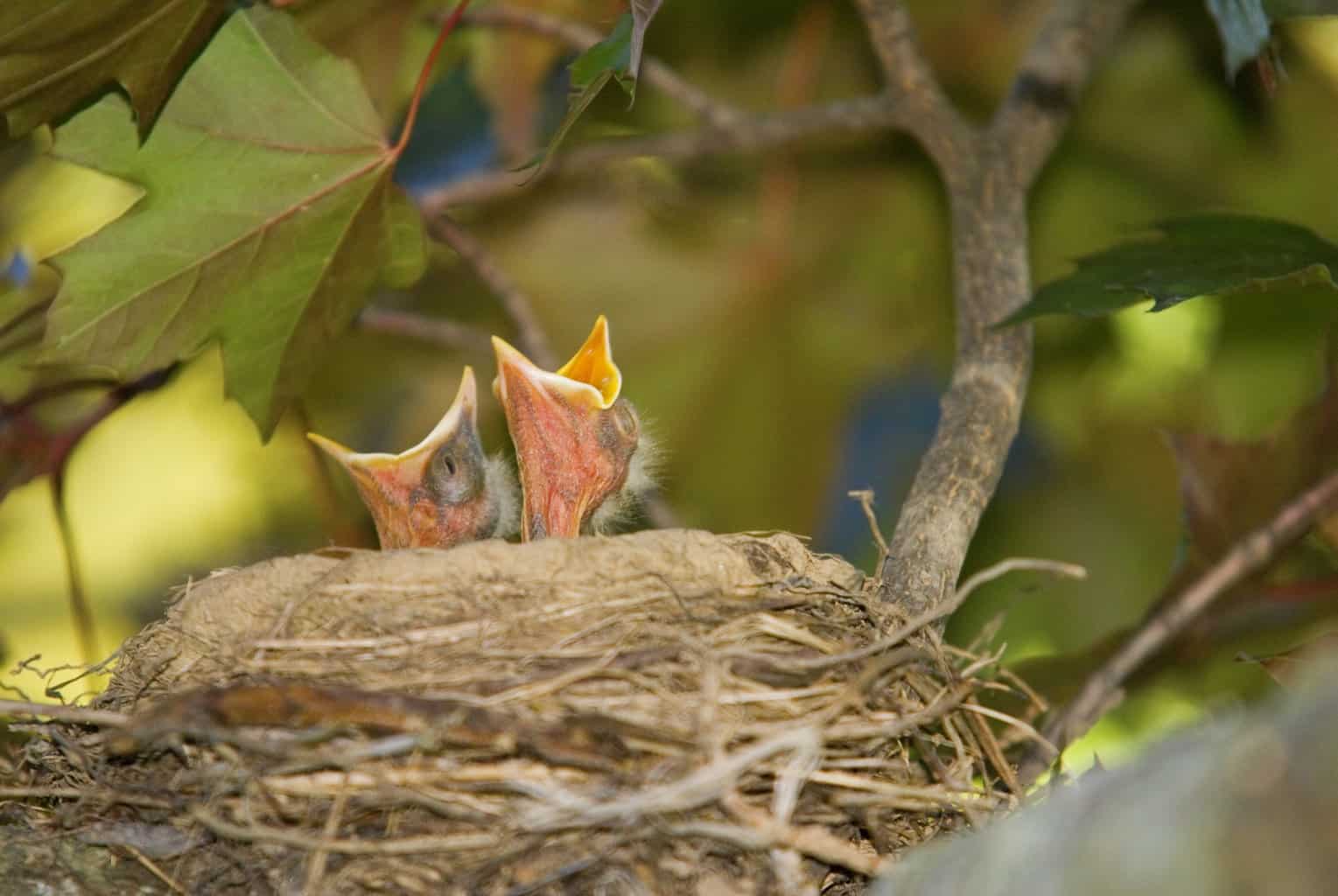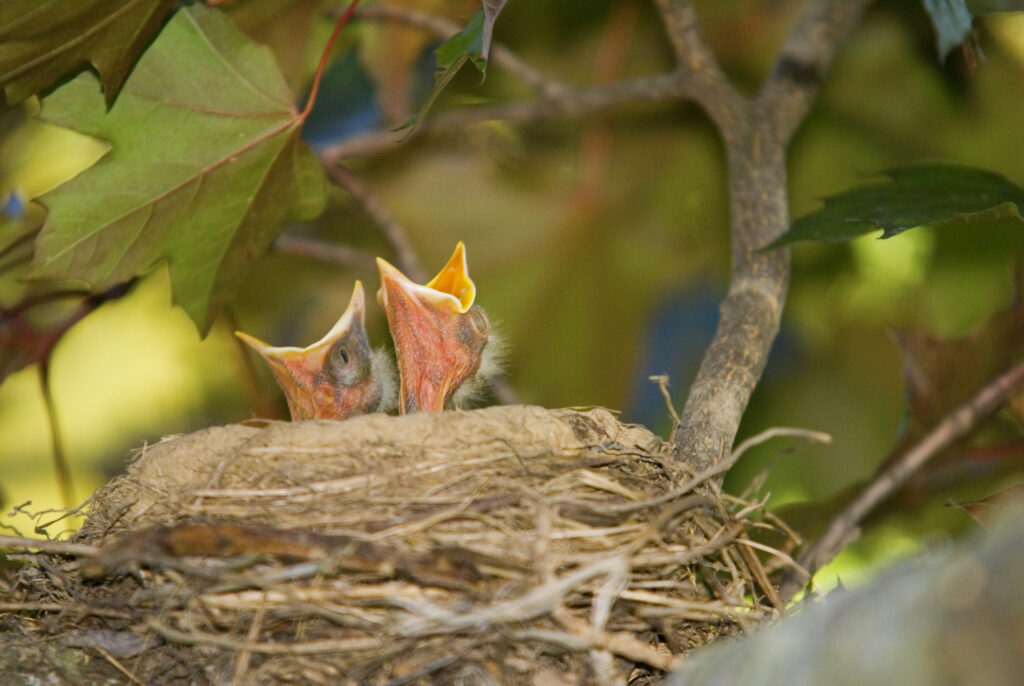Nature can often be hard and harsh, and for wild birds, as for us, not everything always goes according to plan.
Baby birds are particularly vulnerable; sadly, not all will make it to adulthood. The difficult thing for many birdwatchers is understanding when to intervene and when it will do no good and may even be detrimental.
If you are wondering what baby birds eat, this might be because you have spotted a baby bird on its own and are wondering how you might care for it.
The truth is that a baby bird on its own might not always need your help. You might do it harm by intervening.
And even when you can rescue a baby bird, feeding it is usually best left to the experts.
What To Do If You Find a Baby Bird
If you find a baby bird on its own, you may be tempted to rush in immediately and save the poor little creature.
But before you do anything at all, it is very important to wait, watch and observe the situation carefully.
The first thing to determine is whether the baby bird you are looking at is a nestling or a fledgling.
Nestlings are tiny baby birds that should not usually leave the nest. But they can sometimes fall out and end up on the ground. A nestling will often be bare or have few feathers.
Fledglings are baby birds that have grown to the stage where they are ready to fly the nest.
Because these young birds are just learning to fly, they may often spend quite a lot of time on the ground and linger around where their parents still help them.
Fledgelings usually have many feathers, though they often won’t have full adult plumage.
What To Do If You Find a Nestling That Has Fallen From a Nest
If you see a nestling and can see a nest nearby, the first course of action should be to see if you can gently return the baby bird to the nest.
It was thought that parent birds would stop caring for a baby bird if it had a human smell.
But now, it is believed that most parents will continue to feed a baby if they can, whether a human has touched it.
If the nest has fallen onto the ground, try to place it back up in a tree or shrub, where it will be safer from predators. And place the baby bird very carefully back into it.
Watch the nest from a distance for the next couple of hours. Hopefully, the parent or parents will return.
If there is no sign of a parent or there is no nest in sight, you might need to take further action, and hand-rearing may be required.
What To Do If You Find a Fledgling Bird
If you see a fledgling bird, the first thing is to observe the situation to see whether the bird is in trouble.
If the bird is uninjured, you may often simply be able to watch and wait to see if parents show up to feed it or if it flies off.
If you are certain that the bird is not just resting, and there seem to be no adults nearby, you might consider placing some shelter, like a branch with leaves over him, to reduce the chance of predation. The fledgling may still recover and fly off.
Calling in the experts is a good idea if he does not recover.
Call In Experts Rather Than Feeding a Baby Bird Yourself
If a baby bird has been abandoned or has lost its parents and is not yet at a stage where it can care for itself, hand-rearing and hand-feeding may be the only option.
But this should only be considered a last resort because it is a difficult and time-consuming business.
Wherever possible, it is best to call in experts rather than attempting this yourself since there is a lot of complexity and effort involved. How, when and with what baby birds can be fed depends on a range of factors, including their specific species and exact growth stage.
Therefore, if you think a baby bird may need help, it is best to call a local wildlife charity or animal rescue center that will know precisely what is required to give the baby bird the best possible chance of survival.
Many groups will come and take baby birds away to rear them in the right way.
And even if they cannot help directly, they will often be able to give you more specific advice about how to care for the baby bird yourself.
Sadly, a hand-reared bird often won’t make it without professional care.
They may die from an incorrect diet, stress, an undiagnosed illness or injury, or fail to survive once released back into the wild.
It is also important to note that keeping wild birds captive (even for the best of reasons) is sometimes illegal unless you have a license.
And in some areas, it may be illegal to release a wild bird once you have brought it into your home.
How Are Baby Birds Fed?

Part of the reason it can be challenging to care for a baby bird is the way birds are fed in the wild.
Baby birds on the nest are fed by their parents, who will regurgitate what they eat themselves into a baby bird’s beak.
Fledgling baby birds are still fed by their parents, but they will pick up the skills they need to feed themselves at this stage.
What Do Baby Birds Eat in Nature?
The specific diet may contain insects, seeds, and/or fruit, depending on the diet of the species in question. Though a regurgitated insect diet is common for the young of a range of wild bird species.
When Can a Baby Bird Eat on Its Own?
When specifically a baby bird will fledge and begin to eat on its own depends on the specific species.
Some are much quicker to become more self-sufficient than others. So to answer this question, you will need to know which type of bird you are dealing with.
What Should You Feed Baby Birds That Have Lost Their Parents?
If you cannot find an expert to take on the task, feeding nestlings that have fallen from a nest can be a major challenge.
But if you want to take it on or provide something before experts arrive, you must mimic an adult bird and feed from a syringe or pipette. Bird parents are easy to deal with. But small injured birds might be a challenge.
Often, baby birds at this stage are fed a soft mix of cat or dog food, hardboiled egg, and/or crushed mealworms made into a liquid paste.
But the problem is that you need to know what species you are dealing with and its exact age before making the specific formulation that will be best for the baby bird in question.
A fledgling can be a little easier to care for. Try offering a mix of bird seeds and mealworms to see if the baby bird helps himself. If he does, that is great. You will need to determine what type of bird it is if he does not.
Then provide the preferred food for that particular species with a pair of tweezers until it is a little older.
Softened mealworms are one food often provided for a range of bird species, but they won’t be the best option for all.
Should You Provide Water to a Baby Bird?
It is important to ensure that a baby bird does not become dehydrated. Nestlings get their water from the food their parents feed them. Mother birds are good at fending for their young ones.
It can be very difficult to feed water safely to a baby bird, especially a younger one. Don’t give a dish of water or anything – the baby birds won’t know what to do and may even drown.
If you have found a fledgling that may be at a stage where it is beginning to feed itself and are waiting to see if it recovers, you could place a shallow dish of water close by to see if it takes a drink before it recovers from a potential shock and flies off.
How Often Must Baby Birds Be Fed?
Finally, one other thing to note before you take on a baby bird and try to help it recover is that nestlings need to eat very small but frequent meals.
Baby birds usually need to eat every 10-20 minutes for 12-14 hours a day, depending on their age and the particular species. So think very, very carefully before you take on the job.

